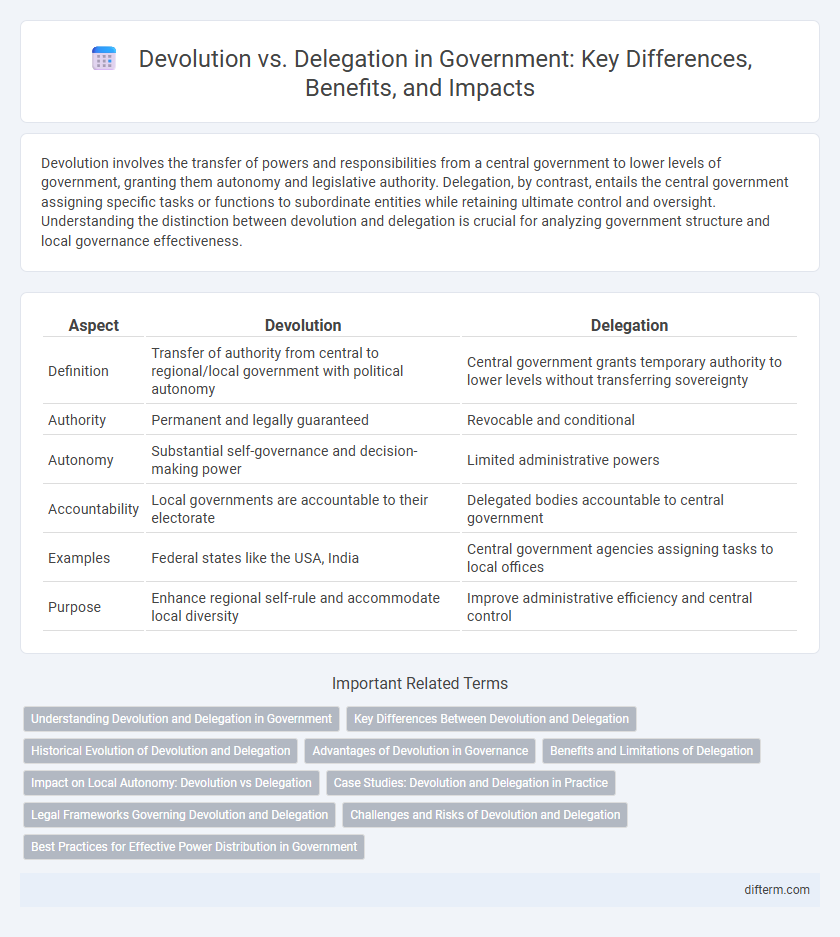Devolution involves the transfer of powers and responsibilities from a central government to lower levels of government, granting them autonomy and legislative authority. Delegation, by contrast, entails the central government assigning specific tasks or functions to subordinate entities while retaining ultimate control and oversight. Understanding the distinction between devolution and delegation is crucial for analyzing government structure and local governance effectiveness.
Table of Comparison
| Aspect | Devolution | Delegation |
|---|---|---|
| Definition | Transfer of authority from central to regional/local government with political autonomy | Central government grants temporary authority to lower levels without transferring sovereignty |
| Authority | Permanent and legally guaranteed | Revocable and conditional |
| Autonomy | Substantial self-governance and decision-making power | Limited administrative powers |
| Accountability | Local governments are accountable to their electorate | Delegated bodies accountable to central government |
| Examples | Federal states like the USA, India | Central government agencies assigning tasks to local offices |
| Purpose | Enhance regional self-rule and accommodate local diversity | Improve administrative efficiency and central control |
Understanding Devolution and Delegation in Government
Devolution in government refers to the statutory granting of powers from the central government to regional or local administrations, enabling these bodies to make decisions independently within specified areas such as education, transportation, or healthcare. Delegation involves the central government transferring specific tasks or authority to a subordinate agency or official while retaining the ultimate control and ability to revoke delegated powers. Understanding the distinctions between devolution and delegation is essential for effective governance, as devolution creates autonomous governance structures, whereas delegation involves temporary or controlled authority without full independence.
Key Differences Between Devolution and Delegation
Devolution involves the transfer of power and authority from a central government to regional or local governments, granting them constitutional autonomy and legal rights to self-governance. Delegation refers to the temporary assignment of administrative responsibilities from higher authorities to subordinate units without transferring sovereignty or constitutional status. The key difference lies in devolution creating permanent, constitutionally recognized powers, whereas delegation maintains centralized control with limited, revocable authority.
Historical Evolution of Devolution and Delegation
Devolution emerged as a significant political development during the late 20th century, notably in the United Kingdom with Scotland, Wales, and Northern Ireland receiving legislative powers in the 1990s to promote regional autonomy. Delegation, rooted in classical administrative theories from the early 20th century, primarily involved central governments transferring specific administrative functions to subordinate agencies without granting political autonomy. The historical evolution of devolution reflects a shift towards decentralization emphasizing political empowerment, whereas delegation historically focused on administrative efficiency within a unitary state framework.
Advantages of Devolution in Governance
Devolution enhances local governance by transferring decision-making powers and resources directly to regional or local authorities, boosting responsiveness and accountability. It promotes tailored policy-making that reflects the unique social, economic, and cultural needs of distinct communities, leading to more effective public service delivery. Fiscal autonomy granted through devolution also encourages innovation and efficiency, enabling local governments to better manage resources and stimulate regional development.
Benefits and Limitations of Delegation
Delegation in government enables central authorities to assign specific responsibilities to lower levels or agencies, enhancing administrative efficiency and allowing specialized bodies to address local needs effectively. However, delegation carries limitations such as potential ambiguity in accountability, risk of inconsistent policy implementation, and dependence on the capabilities of delegated entities. Balancing control with autonomy is critical to ensure delegated powers achieve intended service delivery improvements without undermining central oversight.
Impact on Local Autonomy: Devolution vs Delegation
Devolution grants local governments constitutional authority to make decisions independently, significantly enhancing local autonomy by transferring real power and responsibility. Delegation involves central governments assigning specific tasks to local authorities while retaining ultimate control, limiting the scope of local decision-making and autonomy. The degree of local autonomy varies considerably, with devolution promoting self-governance and delegation maintaining centralized oversight.
Case Studies: Devolution and Delegation in Practice
Devolution involves the transfer of decision-making powers from central to regional governments, exemplified by the United Kingdom's Scotland Act 1998, which granted Scotland its own parliament with legislative authority. Delegation refers to the central government assigning specific responsibilities to subordinate entities while retaining ultimate control, as observed in India's Panchayati Raj system, where local bodies execute administrative functions under state supervision. Comparative case studies reveal that devolution fosters greater regional autonomy and tailored policy-making, whereas delegation maintains centralized oversight with limited local discretion.
Legal Frameworks Governing Devolution and Delegation
Devolution involves the statutory transfer of powers from a central government to regional or local governments, established through constitutional or legislative frameworks that ensure autonomous decision-making and legal authority within specified competencies. Delegation refers to the assignment of specific functions or tasks from central authorities to subordinate entities, governed by administrative laws or regulations, without transferring sovereignty or constitutional authority. Legal frameworks for devolution typically embed protections for regional autonomy and fiscal independence, whereas delegation frameworks emphasize administrative control and reversibility of powers.
Challenges and Risks of Devolution and Delegation
Devolution poses challenges such as potential inconsistencies in policy implementation and risk of reduced central government control, which may lead to regional inequalities and governance fragmentation. Delegation carries risks including unclear authority boundaries and accountability issues, potentially resulting in inefficiencies and conflicts between central and delegated agencies. Both mechanisms demand robust legal frameworks and oversight to mitigate risks of corruption, mismanagement, and overlapping responsibilities in government operations.
Best Practices for Effective Power Distribution in Government
Devolution involves transferring power and decision-making authority from central government to lower levels, ensuring autonomous governance and local accountability. Delegation permits central government to assign specific tasks or responsibilities to lower authorities while retaining ultimate control and oversight. Best practices emphasize clear legal frameworks, well-defined roles, and strong institutional capacity to balance autonomy with accountability and optimize efficient public service delivery.
Devolution vs Delegation Infographic

 difterm.com
difterm.com